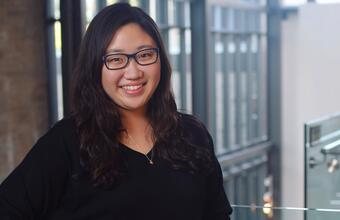
It all started in high school for Christine Moon.
She walked into a long-term care home in her Toronto neighbourhood – almost by accident – seeking to fill her forty hours of volunteer work so she could graduate.
Christine ended up staying on with the long-term care home for four years, right into her undergraduate degree and through her masters studies. Over that time, she observed many non-English-speaking older Canadians who were not receiving the same level of care as their English-speaking peers.
“During my undergraduate degree, I studied anthropology and wrote a thesis looking at ideals for end-of-life care for Korean-Canadian elders,” she says. “I then completed a Master of Science where I spent time in an outpatient palliative care clinic asking patients about their experiences with their family doctors.
“Most people have been in a relationship with their family physicians for far longer than any with any hospital team – as it should be – and so if a family physician is able to provide better emotional care it not only relieves the burden from really expensive hospital care, but also could mean better healthcare outcomes for patients,” she adds.
Her PhD work at Queen’s, which began in 2017, hearkens back to her undergraduate degree work while also looking at the important questions raised in her Masters. It focuses on access to medically assisted dying for racialized Canadians.
“The preliminary data that's come out so far shows that most people who are asking for, and receiving, medically assisted dying are white Canadians,” she says. “So, why is there a gap? Is it that we're not adequately providing this health care service? Putting aside the ethical issue of whether medical assistance in dying should have been legalized, it’s a healthcare service that we offer so we have to offer it equitably.”
The timeliness of Christine’s research topic – medically assisted dying having been legalized in Canada two years ago – earned her a prestigious Vanier Scholarship.
Palliative care, as Christine points out, is not just end of life care, but also deals with pain and symptom management, quality of life, and psychosocial care – which makes her joint MD/PhD program, offered by the Queen’s School Medicine and School of Graduate Studies, the perfect fit to examine these types of questions.
“The joint program is a big plus,” she says. “It really gives me the opportunity to focus on my research as well as my medical education at same time.”
Christine is currently studying for her comprehensive exams which she will complete before she begins medical school. Meantime, in addition to many hours of studying, Christine is continuing her volunteer work in Kingston with organizations such as Hospice Kingston.
She is also taking the time to reach out across campus and build her network – advice she recommends to anyone starting graduate studies.
“I think because Queen’s is a little bit smaller, it's easier to meet people in other departments and collaborate with them – and they are going through the same thing as you, so it is important to have that social support,” she says. “Try everything that seems interesting – it may mean more work, but you get to meet a lot of people. I didn't think that I would receive a Vanier Scholarship but you take the initiative and you see what happens.”
Facebook: “The preliminary data that's come out so far shows that most people who are asking for, and receiving, medically assisted dying are white Canadians…So, why is there a gap? Is it that we're not adequately providing this health care service? Putting aside the ethical issue of whether medical assistance in dying should have been legalized, it’s a healthcare service that we offer so we have to offer it equitably.”
Christine Moon’s timely research topic earned her a Vanier Scholarship. Learn more about her experience in the joint MD/PhD program offered by the Queen’s School of Medicine and School of Graduate Studies.